Posts Tagged ‘Year End’
Churches in Washington are Using Coffee to Change the Lives of Refugees and Immigrants
If you’ve been to Western Washington, you know that coffee is a big deal. Seattle consistently ranks near the top of “best coffee cities in America.” One analysis even found there are 56 coffee shops for every 100,000 people.
Coffee is such a big deal, in fact, that many local churches have fully outfitted coffee shops to meet the caffeine needs of Sunday morning guests. But what if those coffee shops could serve an even bigger purpose — what if they could help welcome refugees and immigrants?
That’s the question Holly Andrews asked herself when she moved to Washington in 2011.
The Seed of an Idea
Holly’s interest in welcoming refugees and immigrants started when she tutored a Somali family in college through World Relief. “It was such a great adventure getting to know [the family’s] culture and language, sharing food together and growing in a trusting relationship,” Holly said.
Inspired by this family’s story and a growing awareness of her refugee and immigrant neighbors, Holly went on to become a teacher for English language learners, eventually completing her masters in linguistics.
Later, while working at Bethel University in Minnesota, she led a study-abroad course in Cambodia where the seed of an idea was planted.
One of the agencies she and her students visited ran a cafe where they provided job training for women survivors of trafficking. “I loved that [the program] gave women a chance to work with dignity and demonstrated the grace of God by meeting them where they were at,” Holly said.
She felt so moved that she even hoped to return to Cambodia to help with the cafe program. But, “God had different plans.”
Barista Training for Newcomers
Shortly after returning from Cambodia, Holly and her husband moved to Washington, and Holly began working at World Relief. She also started attending Calvary Chapel South in Kent. The church had a coffee shop, which reminded her of her time in Cambodia.
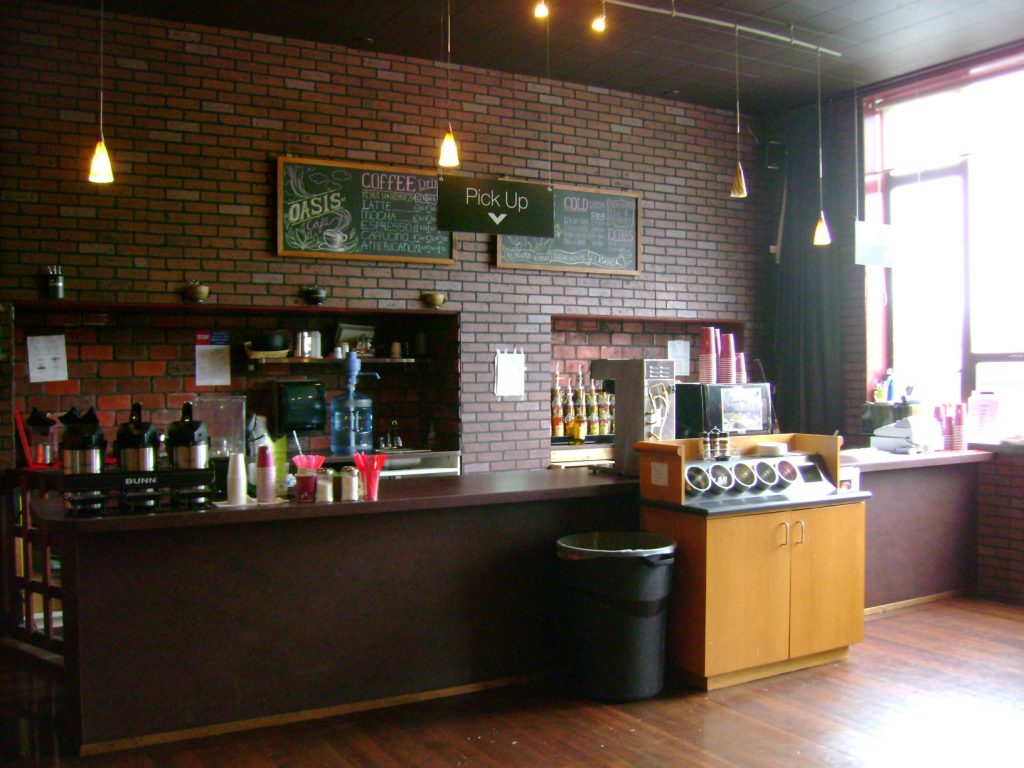
“I thought, wow, this would be a really neat opportunity to partner together — the church and World Relief — and provide some practical training [to refugees].”
Within a year, Holly helped Calvary Chapel South launch a barista training program for newly arrived refugees and immigrants. Since then, Holly has also launched the training program at Brooklake Church in Federal Way, where she now works as the Outreach Director.
Both churches partner with World Relief Western Washington’s Employment Services to identify and refer participants to the programs. So far, the two churches have trained more than 25 refugees.
More Than a Training Program
Much like the Cambodian cafe that first inspired Holly, the barista program in Washington is designed to meet each participant’s individual needs. Focusing on only a few students at a time, training sessions are tailored based on the trainee’s prior work experience and English level.
Participants are enrolled in a 12-week program that takes place every Sunday while church coffee shops are up and running. Each week, participants focus on learning how to run one aspect of the coffee shop, while also practicing their English and customer service skills.
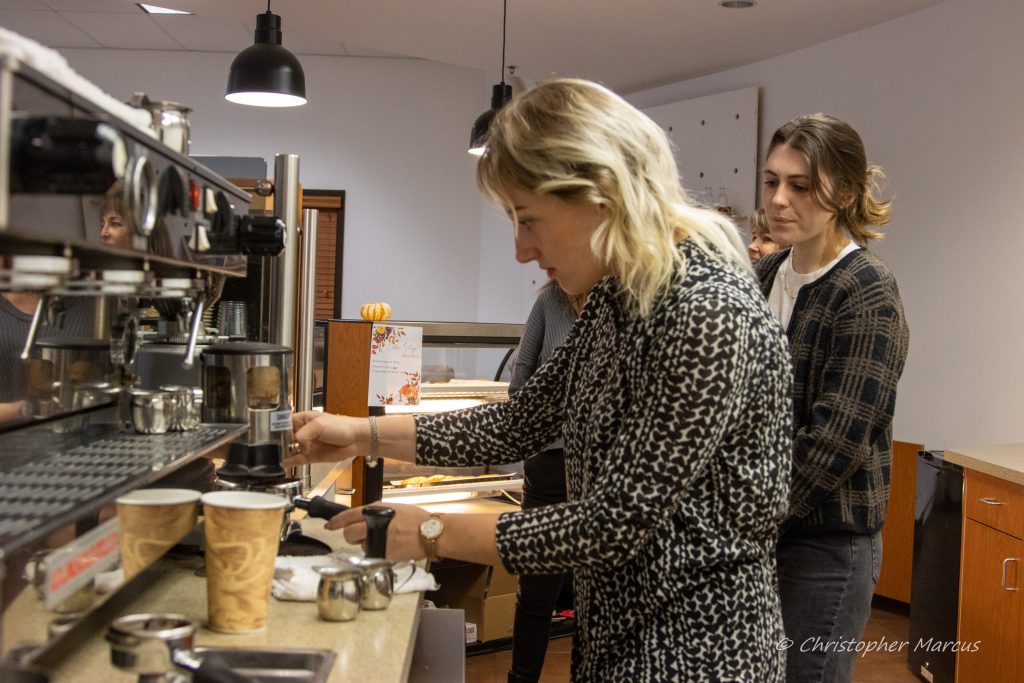
But there’s more to the program than barista skills and English — there’s an opportunity to form friendships. Tutors intentionally leave space for navigating culture and offering encouragement, advice and even prayer when appropriate.
“The churches don’t just help our participants learn new skills,” said Santa Pradhan, Employment Program Manager at World Relief Western Washington. “They also welcome them with open arms and give them a sense of community.”
As tutors help trainees feel like “less of a stranger,” trainees help tutors expand their understanding of refugees and immigrants and clarify misperceptions. “Our participants have been instrumental in helping the church to be better at following God’s call for us to welcome the stranger,” Holly said.
As participants and volunteers become invested in one another’s lives, many form friendships that last long beyond the end of the program.
Careers Beyond Coffee
This was the case for Hawraa. After resettling in the U.S. from Iraq, she joined the barista training program in early 2016. Today, Hawraa remains friends with Holly and the volunteers from Calvary Chapel South’s coffee shop training, and she credits the program with teaching her more than barista skills. She also learned customer service and how to interact with others in a U.S. workplace, lessons that would carry her career beyond the coffee shop.
“[The barista program] was the first thing that I participated in that was close to a job when I first came to the United States. It prepared me for bigger things that I went on to do,” she said.
Hawraa is now working as a case manager with Puget Sound Training Center, helping other refugees, immigrants and under-served populations achieve career success in the U.S.
When asked what advice she would give to U.S. churches hoping to welcome refugees and immigrants, she said, “Please offer them participation in programs and events, help them as much as possible with their English since most are too embarrassed to make mistakes, and just smile! Seeing smiling, welcoming faces was one of the best things when coming to the United States.”
Why the Church?
Like World Relief, Holly believes the church is called to embody the hope of Jesus in the midst of a hurting world. One of the ways churches in the U.S. can do that is by welcoming new immigrants into their communities and seeking to learn from one another.
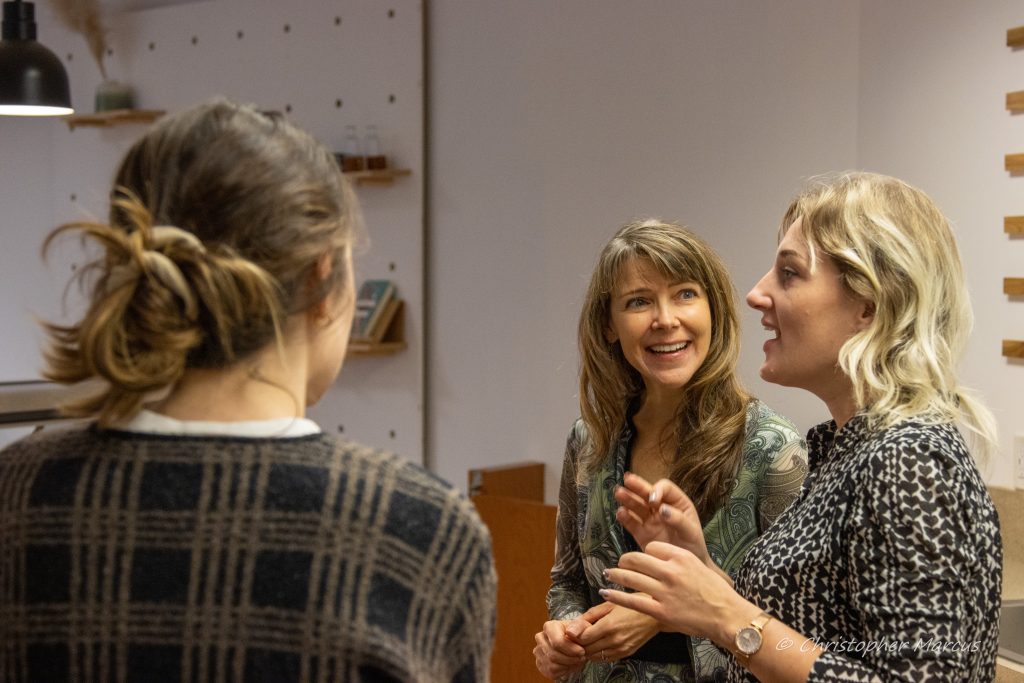
“We see in the establishment of the early church, God’s design… is for people to come together, pour over his Word and to fellowship with one another in a deep and devoted way,” she said. “How amazing when the local church can enfold newcomers into this kind of community.”
For churches not yet connected with refugees and immigrants, Holly suggests first discovering who is already providing services for refugees and immigrants, including established immigrant communities. Work together to determine how best to be a supportive partner in the resettlement process.
She also recommends taking note of what your church already has that might help in welcoming someone who has recently arrived in the U.S.
While not every church has a full coffee shop, others may have shuttles available to provide transportation to local thrift stores or markets, or business owners from local churches might host a small job fair. English tutoring, access to computers, job search assistance and fun after-school activities can also make a big impact.
But most importantly, Holly emphasizes the value of friendship as we seek to create more welcoming communities where everyone can thrive.
“The church can first and foremost be a friend,” she said. “Rest from ‘doing’ and leave room for just being together, sharing life and learning from one another. Be hospitable and accept hospitality. This is a ministry in itself.”
Want to be a part of creating lasting change for refugees, immigrants and people experiencing vulnerability around the world? Learn how we’re moving forward together.
If your church is ready to dive deeper into how best to love and welcome your refugee and immigrant neighbors, check out The Workshop, World Relief’s e-learning platform. Use code CHURCH25 for 25% off through January 31, 2023.

Kelly Hill serves as a Content Writer at World Relief and previously served as Volunteer Services Manager at World Relief Triad in North Carolina. With a background in International and Intercultural Communication, she is passionate about the power of story to connect people of diverse experiences.
Breaking Down Barriers: How Autism Has Helped Me Serve My Refugee Neighbors
I’ve lived in the same place my whole life. I have never had to leave everything I know out of fear for my life. In many ways, my life and the lives of my refugee and immigrant neighbors couldn’t be more different.
Yet, I do know what it feels like to be on the outside looking in. For as long as I can remember, I have felt somewhat out of place, like I wasn’t meant for this world in some way. I didn’t know the reason for this — it was just the way I was.
It wasn’t until I was 20 years old that I finally realized why I felt so out of place. That’s when I first heard, “You have autism.”
On one hand, I was relieved. I finally had an answer for why I felt like a person who was told to play the game without being given the rules. On the other hand, it expanded my understanding of just how much our society is not built to accommodate people like me.
Fighting the battles that come along with having autism has been difficult, but it’s also afforded me a unique love for learning from those whom society often relegates to the margins. Over the years, this has meant seeking to be mentored by African American pastors, working with the imprisoned and searching out opportunities to see how my Christian faith intersects with building up my local community.
In college, I was introduced to this type of ministry when I had the opportunity to work with refugees as an ESL tutor. For me, this felt like a natural extension of my passion for reflecting God’s love to those on the margins. Years later, through God’s providence, I was given the opportunity to continue serving refugees when I joined the World Relief Upstate SC team right here in my own community in South Carolina.
Now, in my role as the Upstate SC Mobilization and Development Coordinator (and formerly as the Church and Volunteer Engagement Coordinator), my life is full of paradoxes. I am a person who struggles with social interactions, but I must frequently speak to volunteers, churches and other community partners about how we are called to love and serve refugees. Accepting unpredictability and ambiguity does not come naturally to me, yet refugee resettlement is anything but predictable.
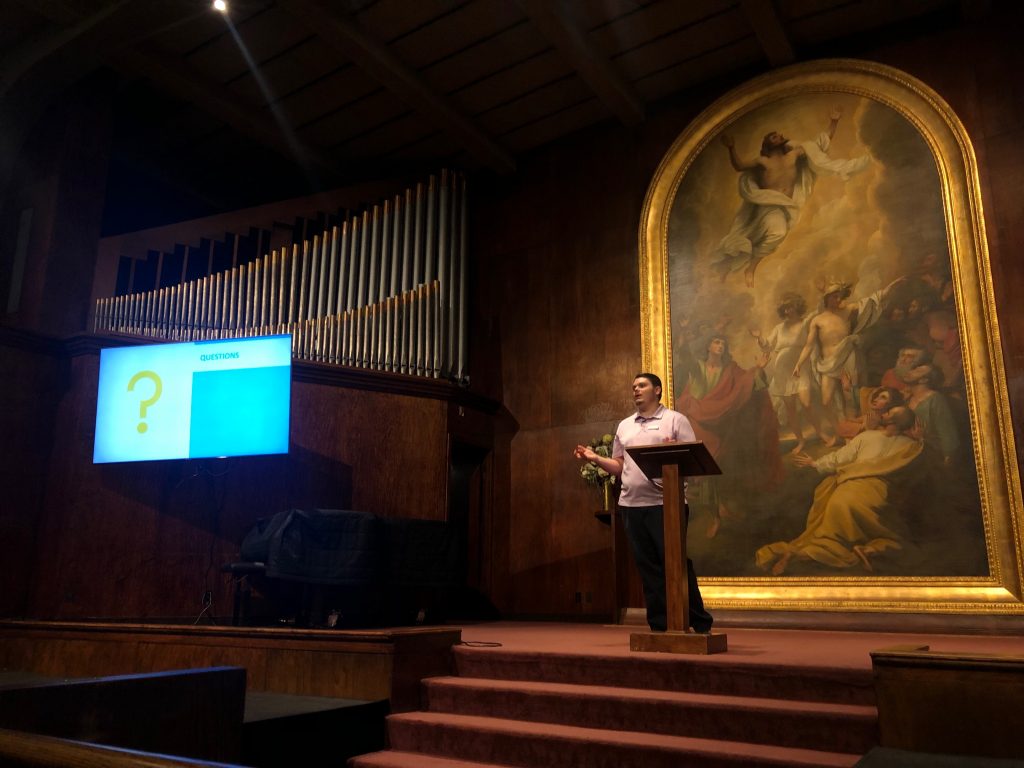
While these are paradoxes, they show that God uses every single person to advance his cause and that his kingdom breaks down barriers of gender, race, ethnicity and even disability. In fact, because of my disability, I believe it can sometimes be easier for me to put myself in the shoes of refugees and immigrants who are feeling out of place and lost in a culture and society that wasn’t built for them.
For many refugees and immigrants, navigating new communities, grocery stores, school systems, workplaces and more can feel like trying to put a puzzle together without knowing what the finished product should look like. That’s a feeling I can certainly relate to.
My experience with autism spectrum disorder also gives me compassion for the fear and uncertainty that many of our refugee and immigrant neighbors face in their daily lives. I understand what it means to cling to Matthew 6:34, which says “do not worry about tomorrow, because tomorrow will worry about itself.”
While I do not discount the many challenges people like me face or the differences between my experience and that of refugees, I do believe wholeheartedly that the good news of God transforms even the most difficult of situations for our good and his glory.
At World Relief, I’ve found a place where I can work within my strengths and limitations as someone who has autism and experience God’s transformation in my life and in the lives of those around me.
World Relief is committed to building welcoming communities that value and accept refugees and immigrants. That same culture has helped me feel valued and accepted. Our Office Director, Brandon Baughn, has been an especially faithful example of this culture of welcome, giving me the blessing of trust in my work and in my perspective not only as someone with autism, but more importantly, as a follower of Christ who is passionate about serving “the least of these.”
This trust has allowed me to run headlong into serving churches and volunteers so that they, too, can create communities of welcome. I am able to do my work knowing that World Relief welcomes my unique perspective and does not see my disability as a hindrance.
Together, we are moving towards creating spaces where people of all nations, backgrounds and abilities can embrace their God-given purpose and live out their full potential.
At World Relief, we are grateful for faithful staff like Austin. We rely on the time, talents and treasure of people like you to continue moving forward together. You can join us by giving today or by checking out our careers page to see if working at World Relief is a good fit for you.
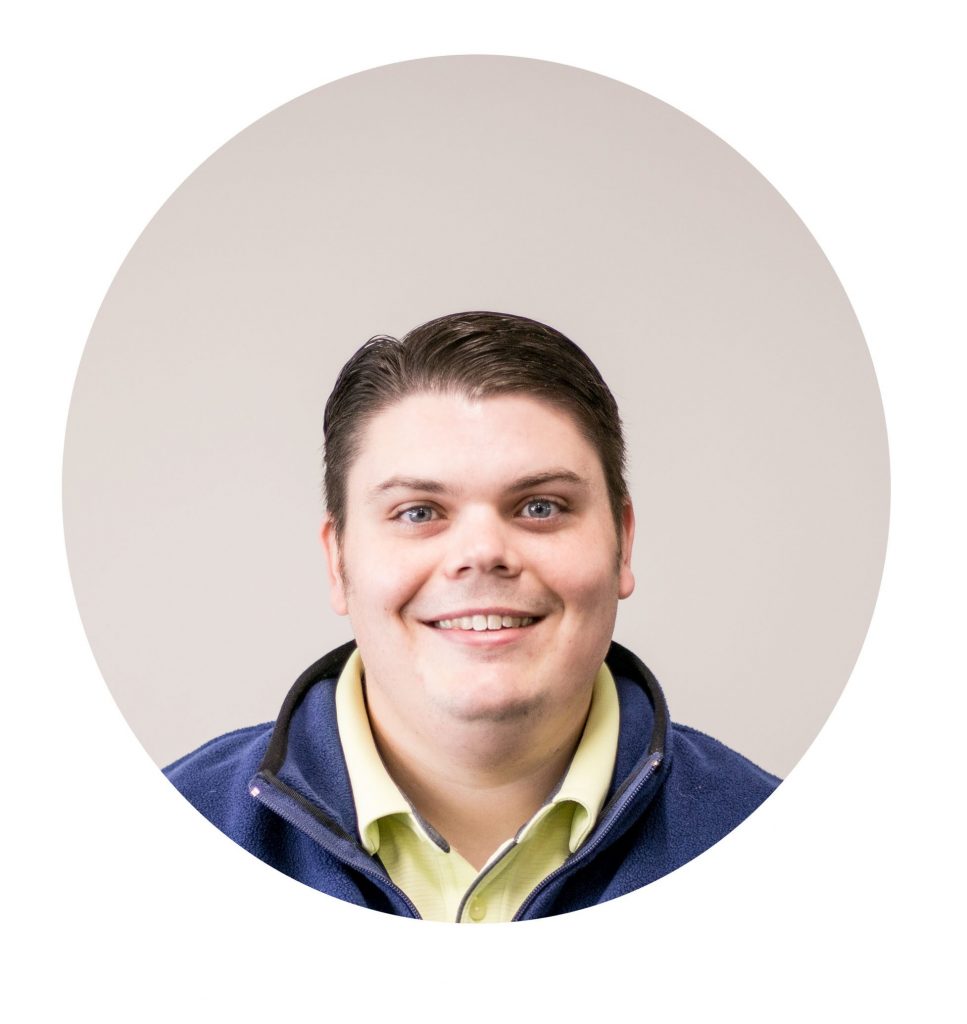
Austin Donahoo is the Mobilization Development Coordinator at World Relief Upstate SC, where he previously served as the Church and Volunteer Engagement Coordinator. He loves integrating his passions for Christian ministry and theology with community engagement, believing that the call of the gospel is to be shown in both word and deed. At World Relief, he works to do this by equipping churches and volunteers to love their refugee and immigrant neighbors.
Disability-Inclusive Development: How the Church Can Answer the Call
“So also we are many persons. But in Christ we are one body. And each part of the body belongs to all the other parts. We all have gifts. They differ according to the grace God has given to each of us.” — Romans 12:5-6
Saying Yes to Wisdom
When the Kanombo Church of Central Africa Presbyterian in Malawi made a call for volunteer Sunday school teachers, they did not consider Wisdom Shaba as a viable candidate. Wisdom, after all, was blind. Having suffered from a skin disease that affected his eyes, he lost his sight at the age of five.
But God had bigger plans for Wisdom.
His church, which is a member of one of World Relief’s church networks in Northern Malawi, had agreed to participate in a disability inclusion training conducted by World Relief.
Wisdom attended the training along with other members of the congregation, and it was there that he learned of the need for Sunday school teachers and volunteered himself.
“Despite my disability,” Wisdom said, “I always tell people in my community not to ignore me in other things they feel I can get involved in. I went to school. I speak good English. So, why not involve me?”
Made in the Image of God
At World Relief, we believe every person is created in the image of God and has inherent value — including those with disabilities. And yet, in communities across the globe, people like Wisdom are often pushed to the edges of society and face significant barriers to participating in their communities and accessing critical care.
This lack of inclusion can increase their risk of poverty, violence, social and familial stressors, illness and even death. As a result, people with disabilities represent some of the most marginalized, making up 20% of the world’s poorest in developing countries.
While the statistic is staggering, we believe the church has a role to play in closing the gap on disability inclusion. We believe the church is called to be a place where people with disabilities are not only served, but also valued and included in all programmatic and worship activities.
After all, Jesus himself spent much of his time on earth serving and fellowshipping with people with disabilities. He calls his church to do the same.
“When you give a banquet,” Jesus said in Luke 14, “ invite the crippled, the lame, the blind.”
That’s why, in 2019, World Relief piloted disability-inclusive programming through our Church Empowerment Zone initiative in Malawi.
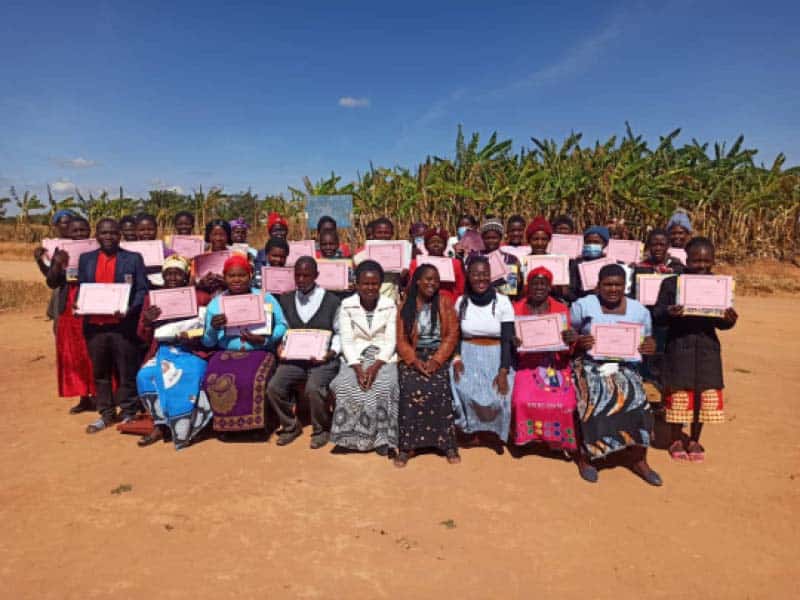
What is Disability-Inclusive Development?
Disability-inclusive development ensures that people with disabilities are able to access and participate in development activities in the same way as persons without disabilities. It is not a separate program, rather World Relief staff, local church leaders and community members receive training that:
- helps church leaders understand the prevalence and impact of disability in their communities
- ensures active involvement of people with disabilities in all phases of a project
- assists church and community leaders in identifying and removing physical, communication, policy and attitudinal barriers to participation in program activities
The fruit of this work has not only brought dignity and restoration to people with disabilities but has also empowered members of the body of Christ to better serve people with disabilities. Through the pilot program alone, more than 400 people with disabilities were reached by the church network.
“World Relief came and opened our eyes to see the most vulnerable among us — people with disabilities…” said one church leader. “We have whole-heartedly embraced [Jesus’] call to care for people with disabilities in our communities.”
An Inclusive World
After Wisdom volunteered to teach Sunday school, the leaders of his church organized a practice session where Wisdom taught a lesson to two children. He used a small book to teach on the topic “guiding children to the Savior.”
Everyone was amazed at the skill with which he explained spiritual truths to the children.
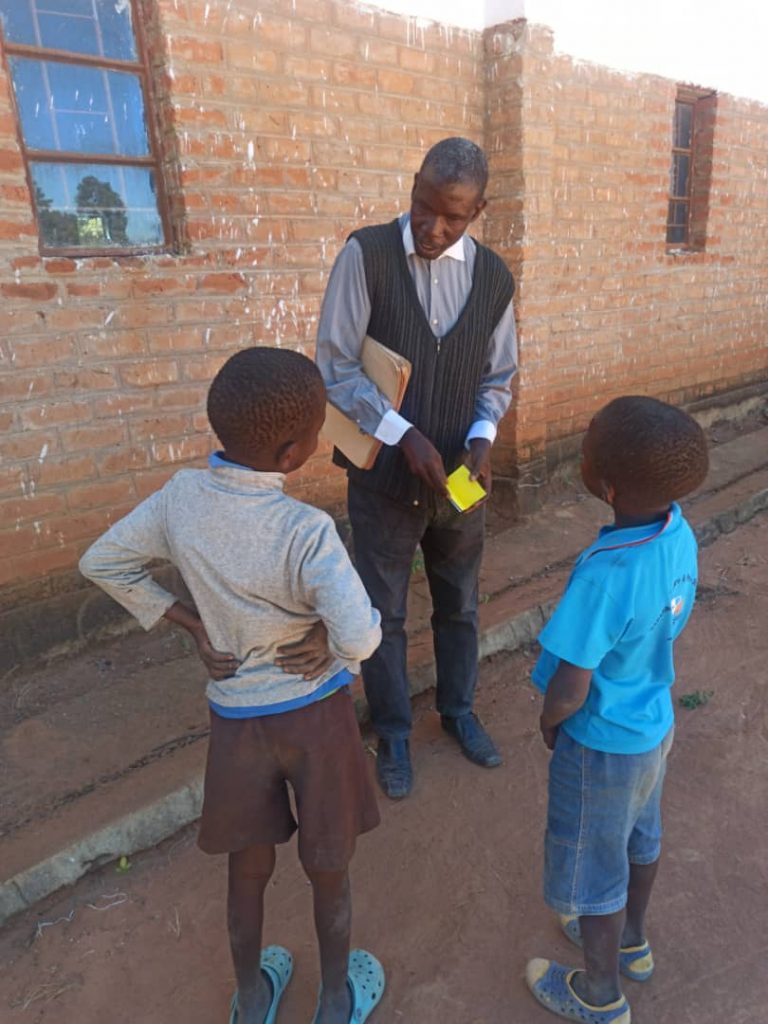
“God creates ways for me to do things that people don’t expect me to do because I am blind.” Wisdom said. “People don’t involve me in community gatherings because they always judge that I cannot do so. But I thank God because He blessed me with this disability I have. I strongly believe that this disability is not a curse.”
Reverend Mphatso Chidothe, who helped facilitate the disability inclusion training at Wisdom’s church shared that he has “realized that disability is not inability.”
“I am pleased with Wisdom for his time management, active participation and his performance throughout the training. I look forward to visiting him at his church one day,” Reverend Chidothe said.
By working through the local church, we are creating communities where people with disabilities are included as active and valuable participants in their communities. Church members come to learn that people with disabilities are not just there to be served, but also have God-given gifts and abilities that they can bring to serving others as well.
Since the programming was piloted in Malawi, World Relief has expanded disability-inclusive programming to church networks in Burundi and Rwanda, and now plans to train churches in six more countries where World Relief works as funds become available.
By removing barriers to participation, we are making way for entire communities to be transformed as the gifts of each and every person are recognized and given space to shine for the glory of God.
Together, we are going further to reach more people through more churches than ever before. Will you join us?
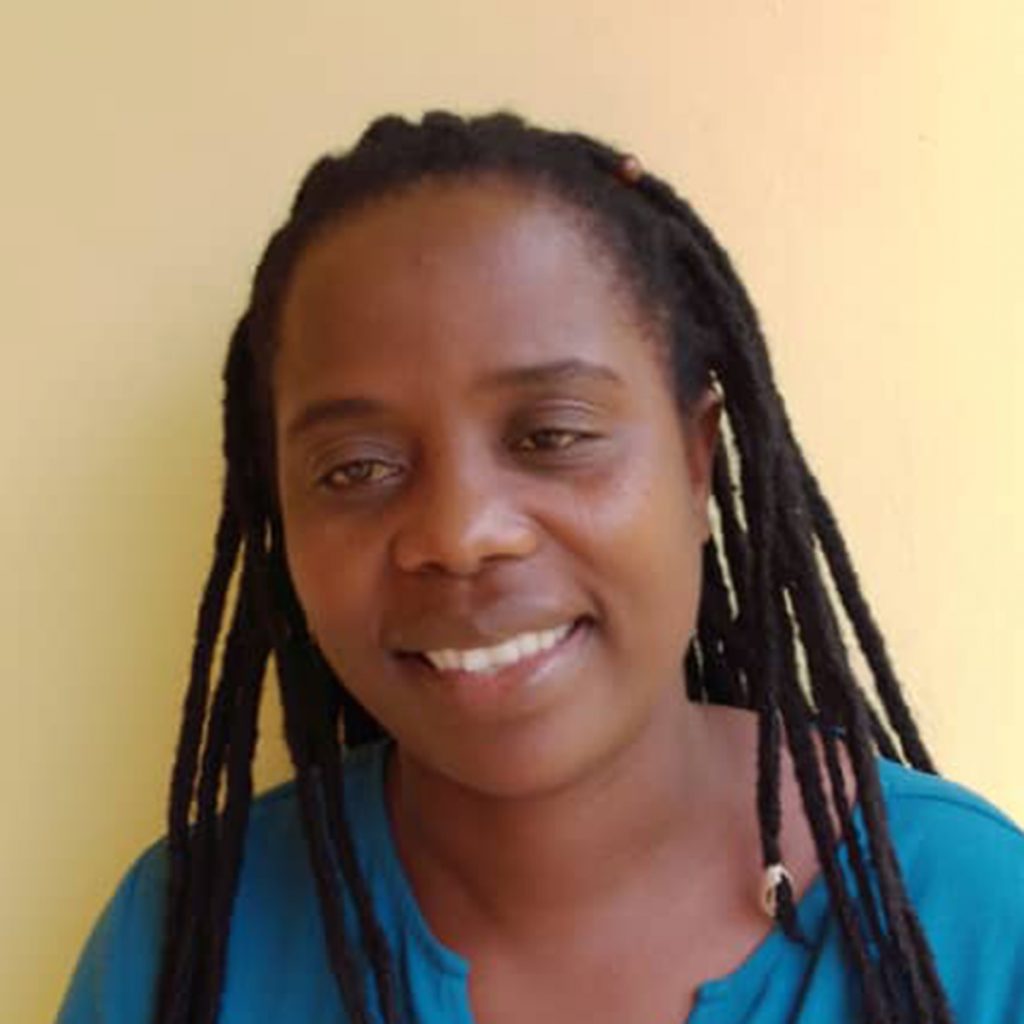
Muhlabase Ziba joined World Relief in August 2019. She works as the Families for Life and Child Development Field Coordinator in Malawi’s Mzimba District where she develops programs, coordinates with stakeholders, conducts trainings and collects stories of impact. She is passionate about helping children build self esteem, strengthening couple relationships and providing neglected children with the psychosocial support they need. In her spare time she enjoys spending time with the children in her own life and watching the Wildlife National Geographic channel.

Rachel Clair is a Content Manager at World Relief. Alongside an amazing team of marketing colleagues, she manages the curation and creation of written and multi-media content for World Relief’s global platforms. With more than 10 years of experience creating content for churches and non-profits, she is passionate about developing content that challenges both individuals and communities to lean into all of whom God created them to be. She holds a BFA from Stephens College and is currently participating in a spiritual formation cohort through the Transforming Center in Wheaton, IL.
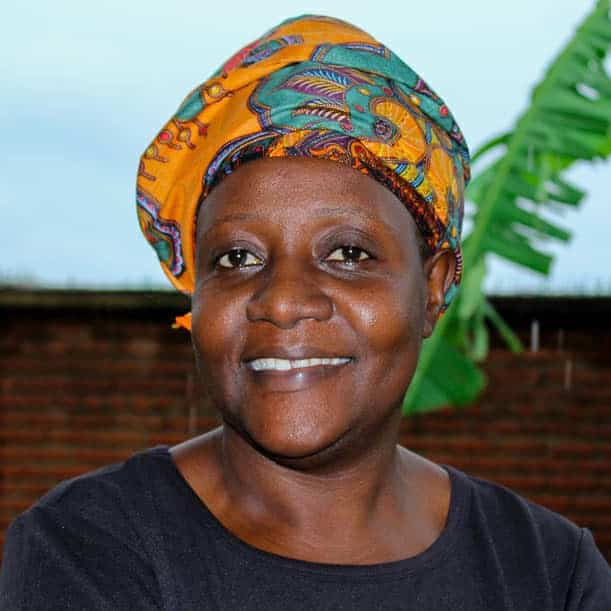
Veronica Kaitano serves as the Gender Equality Social Inclusion Technical Advisor with the World Relief’s Programs Resources Team. Through her work, Veronica supports World Relief’s country offices in ensuring the integration of a gender and social inclusion approach within programming and acts as the global technical lead for supporting implementation and continued growth of World Relief’s couple strengthening model Families for Life, with a specific emphasis on disability inclusion.
Worth the Wait: A Story of Faith, Perseverance and Love, Despite the Odds
For seven years, Congolese refugees (and newlyweds!), Mbimbi and Goreth, didn’t know if they would ever see each other again. Separated by continents, Mbimbi was stuck in Burundi while Goreth resettled and began her new life in America. In spite of the long wait, the two of them never lost hope, their love growing by the day.
“No one can do what Goreth did,” Mbimbi said about his wife’s commitment not to remarry. Instead, Goreth chose to hold onto hope, believing God was faithful and would bring Mbimbi back to her in America.
Where It All Began
In 2008, Goreth was a wife and mother living in Goma, a city in Democratic Republic of Congo (DRC). Her day began like any other day – she woke up, brushed her teeth, made some tea and headed to the market to sell clothes at her stand. It became a day she would never forget when “the fighting broke out.” She recalls, “My daughters, [Christine and Valentine], and I started running, and we found a way to get past Goma to Burundi. That’s when I started my life as a refugee. My [first] husband died in the fights.”
Goreth and her daughters ended up in a Burundian town filled with other refugees. Upon arrival she shares, “I felt relief because of sleeping in a house and churches help us and Christians help us.”
While Goreth and her daughters were refugees in Burundi, Mbimbi was working as an auto mechanic in Baraka, a city south of Goma in DRC.
In 2014, an armed civilian group put pressure on him to “join them for the fight and to be a soldier.” These groups were once formed to defend the Congolese against rebel armies. But tragically, they have created more chaos and violence than protection for the Congolese peoples.
So, when Mbimbi refused, they threatened him. With a target on his back, he reflects, “That was the night my uncle called me and said, ‘They are looking for you.’” That same day, “I told fishermen what happened and ask if they can help me to another place. They hide me in the boat and carry me down river.”
From there, Mbimbi went to Boku, where “they [gave him a] motorcycle to go to Boda.” From Boda, he traveled to Burundi where he ended up in the same town as Goreth.
Having arrived in the same town six years apart, Goreth and Mbimbi met, by chance, while filling out paperwork to earn refugee status. Goreth was farther along in the process while Mbimbi was just beginning his paperwork. Despite crossing paths at different stages in their journey to flee DR Congo, they formed a connection “and began a relationship.” Within a year, they were married.
Oceans Apart
Even though they were living in a safer town than the cities they had fled, Goreth and Mbimbi couldn’t escape the violence. In 2015, their Burundian town experienced fighting; so, when Goreth was given the opportunity to go to America, she agreed. The catch? Mbimbi wouldn’t be able to join her and her daughters. It was a bag of mixed feelings for Goreth.
“To be a refugee is not an easy thing,” she says. “It’s just a thing you have to do to pray to God. God helped me because I became strong and fight for the kids to grow up…in a safer place.”
Leaving behind her new husband, Goreth and her daughters traveled to America not knowing when and if they would ever be reunited with Mbimbi. When they arrived in the U.S., their new lives began right away.
Goreth remembers they were greeted by World Relief staff and volunteers. “[They] had already found an apartment for us,” she recalls.
Staff and volunteers came alongside Goreth and her kids, taking them to doctors appointments and helping Goreth find a job in manufacturing, packing hospital-grade linens. Goreth expresses sincere gratitude for all of World Relief’s help, especially in “the first three to six months.”
Even though Goreth felt “sad sometimes” she shared with deep conviction that she “still waited and prayed to God” for Mbimbi.
At Last, Together Again
Both her and Mbimbi’s prayers were answered when he was resettled to America in July 2022. Finally reunited with his wife, Mbimbi is taking a World Relief “Zoom job class and language class.”
He takes comfort in knowing that once his job and language classes are complete, he can still count on World Relief.
“It’s not like they abandon you,” he said. “If you still need something, they are there to help.”
Mbimbi and Goreth are currently renting a one-bedroom apartment. Now able to dream together, the couple says, “for the future, we are praying to God that we can get our own house.”
Knowing that God has provided for them before, they are trusting, through prayer and perseverance, that anything is possible!
As crises converge, and global conflict forces more people to flee their homes, it takes all of us, to move forward together, to build peace and lasting change. When you give today, you help us build peace in places like DR Congo while also welcoming those like Goreth and Mbimbi who have been forced to flee to the United States.
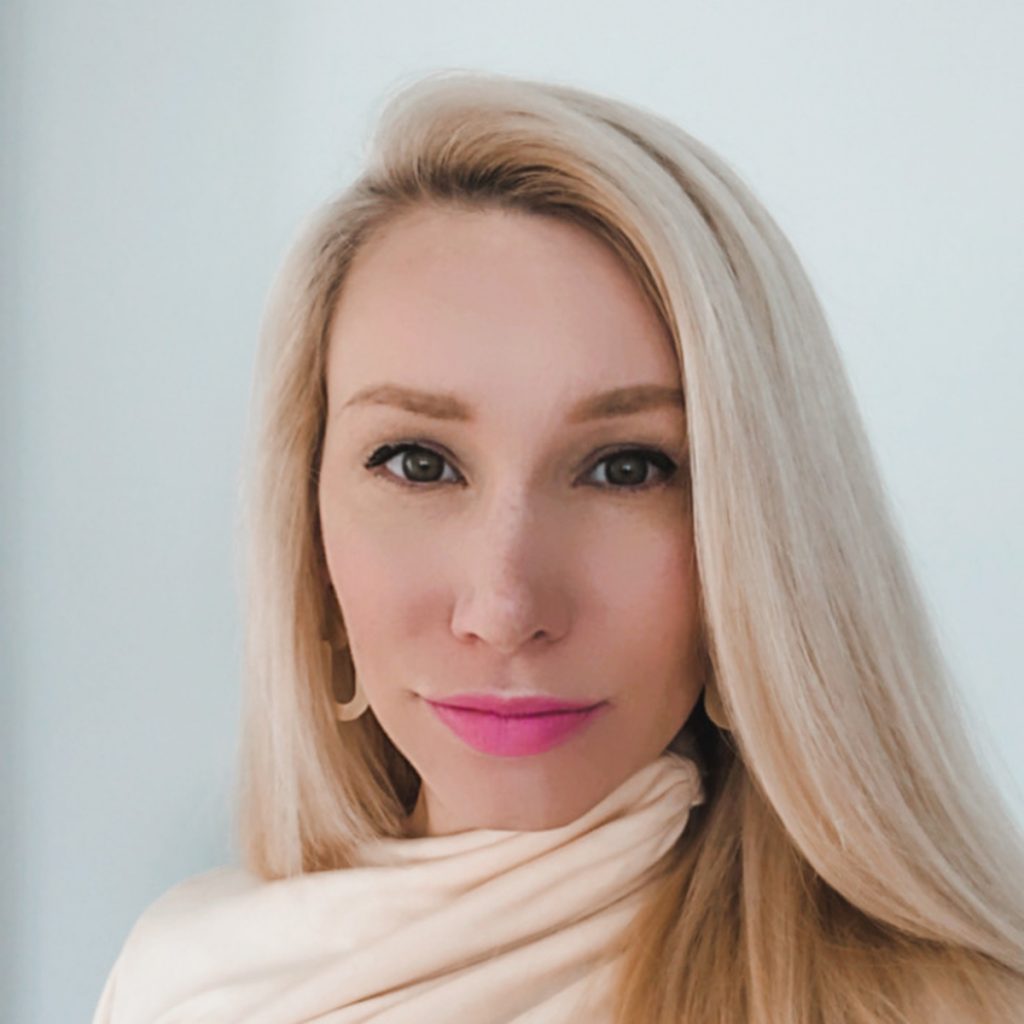
Michelle Visk is a freelance writer passionate about sharing compelling stories of individuals impacted by nonprofits throughout the world. In addition to writing for nonprofits, she recently launched her own interior design e-consulting business, geared at making interior design more accessible to the middle class so everyone can create a home they love. When she’s not writing or doing e-consults, she enjoys spending the majority of her time with her husband and pouring into her two feisty little girls (ages 3.5 and 5) as a stay-at-home-mom. Before becoming a stay-at-home mom, Michelle worked in ministry for 10 years, serving as a Communications Director for a multi-site church. She holds a BS from Butler University.
10 Reasons to Give Thanks Around the World
As followers of Jesus, we are called to be people of hope — to “know the hope to which [Jesus] has called [us]” (Eph. 1:18) and to “hold unswervingly” to it (Heb. 10:23). How, then, can we cultivate and embody hope even in the midst of the world’s suffering?
According to some experts, the answer is simple: gratitude.
Gratitude is one of the strongest predictors of hopefulness, and it’s scriptural. Giving thanks in all circumstances helps draw our focus back to Jesus and his past, present and future faithfulness — not ignoring suffering, but seeing it in light of a God who has promised to transform ashes to beauty and wipe away every tear.
Today, we invite you to join our staff around the world in giving thanks for how God is still working to transform lives and communities through the local church. Will you cultivate hope with us?
1. Burundi
“We are thankful that, with God’s help, we have equipped and mobilized 60 local churches in Nyarusange district to serve their communities, including providing support to 30 people considered to be most vulnerable because they are living with disabilities, orphaned or widowed.
“Churches also distributed 30 chickens to 144 households. The chickens will be able to multiply and provide eggs for eating and selling. Our church network in Nyarusange was even ranked at the provincial level as the number three most active and committed network caring for the most vulnerable!” — Cesalie Nicimpaye, World Relief Burundi Country Director
2. Cambodia
“We are grateful for 53 Kids’ Clubs with over 1,000 children graduating after finishing our 41-week curriculum focused on developing healthy relationships with God, others and self. We appreciate the 100+ volunteers and church and community leaders who supported this. Moreover, we keep praising God for helping our Savings for Life program members grow their savings and improve their financial well-being.” — Romroth Chuon, World Relief Cambodia Program Operations Director
3. DR Congo
“I am most grateful for the field office staff God has called to be part of World Relief DRC. They are beyond dedicated to serving the people of DR Congo and creating change in their country. With grit and prayer, they have pushed through seemingly insurmountable challenges.
“This year, we reached nearly 165,000 individuals with valuable food security resources, we started a new Families for Life program to rebuild marriage relationships through the local church, and we grew our new Church Empowerment Zone in Ituri Province despite security challenges. Numbers alone do not do the DRC program justice — it is the people, the team, who are the measure of success.” — Amanda Patterson, Program Officer, Humanitarian and Disaster Response Unit in DR Congo and South Sudan
4. Haiti
“We are grateful to God for the 440 new youth who joined the second year of the agri-business project in the southeast region of Haiti. We are also grateful to have 105 direct beneficiaries of our housing project, implemented in partnership with Habitat for Humanity in response to those affected by the earthquake on August 14, 2021 in Les Cayes.” — Pascal Bimenyimana, World Relief Haiti Country Director
5. Kenya
“We are grateful that God has blessed Kenya to partner with 489 churches engaging 5,305 volunteers to share on reproductive and sexual-health related messages to 157,271 families in three counties.” — Nancy Owola, World Relief Kenya Monitoring and Evaluation Manager
6. Malawi
“I thank God for what we have managed to accomplish this year, especially through our Families for Life program, which helps strengthen marriages and give families the tools they need to thrive. This year, we have transformed 19,424 couples in our five Church Empowerment Zones! We are celebrating and thanking God for these transformations because we believe that if we transform a couple — if we transform a family — we are going to transform a local church, and the local church is going to transform the community. If the community is transformed, then we are going to transform Malawi.” — Jane Lumanga, Former World Relief Malawi Director of Programs
7. Rwanda
“Through our Savings for Life program, we are grateful to have reached 9,479 community members through 390 new saving groups — 14 of which are digital — with financial inclusion resources and training in key economic development modules such as Financial Literacy and Business Development, Smart Spending and Deciding Together. This is impacting close to 40,000 vulnerable people across the program area — thank you, God!” – Michael Ntambara, World Relief Rwanda Impact and Quality Director
8. South Sudan
“In South Sudan, we’re thankful to God for the work of our SCOPE Health Promoters and local church partners. Together, we have assisted 10,568 children under five with immunizations and treatments for malaria, diarrhea and pneumonia. We have also helped refer 3,213 mothers to health facilities for maternal services. But my favorite is the number of babies delivered with support from our health promoters — 601 new babies! We pray that by God’s grace, these babies will grow up to have a good life in South Sudan.” — Hillary Muni, World Relief South Sudan Area Coordinator
9. Sudan
“We are thankful to God for uniquely granting World Relief Sudan with wisdom to provide solutions for water shortages in the Jabel Marra region through the construction of six check dams. This year, the dams have harnessed enough water for domestic use in over 35,000 households, as well as for fruit farming.
“We are also thankful that God has enabled us to distribute 58,355 metric tons of food to 430,000 Internally Displaced People (IDP) and returnees across three Sudanese states in Sudan, and provide primary health care services to 459,748 IDPs, returnees and host community members in the Darfur region.” — Stephen Gatimu, World Relief Sudan Program Director
10. U.S.
“We are grateful that God has raised up 873 churches and 8,430 volunteers this year to help us welcome refugees and immigrants across the U.S. — whether Afghans escaping the Taliban, Ukrainians fleeing war or individuals and families from around the world looking for safety and an opportunity to thrive. We are especially thankful that 1,600 individuals have been reunited with family members, many after enduring long separations from spouses, children, parents and siblings.” — Mandy Barb, Senior Director of U.S. Programs
Join us in giving more people more reasons to give thanks this holiday season.
Covid, Conflict and Climate Change: How the Church Can Be Hope Amidst Converging Crises
Two years ago, when COVID-19 was just emerging as a global crisis, many of us in the non-profit sector speculated how the pandemic would shape our world. We threw around the phrase “new normal,” despite not having any idea what that would look like over the next month, let alone in the years to come.
Since then, we’ve watched as three converging crises have dramatically impacted the lives of some of the world’s most vulnerable — COVID, conflict and climate change.
The UN estimates that the number of people living in extreme poverty has increased by 100 million as a direct result of the pandemic — the first time in my lifetime this indicator has risen.
Global conflict is also on the rise, with more coups occurring worldwide than any previous year since 1999. Conflicts in Ukraine and Afghanistan have increased the total number of displaced people from 84 million to more than 100 million.
We are currently facing the worst displacement crisis in recorded history, and all the while, climate change continues to exacerbate these crises and more.
A Convergence of Crisis
At World Relief, we’ve seen firsthand how these three intersecting crises have converged to produce unimaginable suffering in vulnerable communities worldwide.
The war in Ukraine cut off much-needed grain exports, intensifying food shortages in places like Turkana where prolonged drought is killing livestock and putting people at risk of malnutrition and starvation.
In South Sudan, flooding caused by increased rainfall has destroyed land and local infrastructure, leaving farmers and pastoralists to feud over fewer resources.
And in places like Democratic Republic of Congo, the COVID-19 pandemic has further depressed an economy already bending under the weight of instability fueled by ongoing conflicts.
The situation is grim. If you’re feeling weary or overburdened, you are not alone. So many of us are feeling the weight of the world’s suffering on our shoulders, and yet, I believe we can still have hope.
In the midst of these complex crises, I believe God still moves through the church to bring hope and healing to the world. I believe this because I see it every day.
Hope Amidst Converging Crises
I see it in Rwanda where the church remains a source of help, hope and information in the fight against COVID-19. As a result of church-led efforts, we support across East Africa, nearly 100,000 people have been vaccinated.
I see it in Kenya, as communities face life-altering climate crises such as drought and resulting famine. There, the church is at the center, revealing new transformative ways of living and teaching people like Lomita to grow drought-resistant crops to restore their bodies while also providing spiritual food to nurture their souls.
I see it in Democratic Republic of Congo, where, several years ago I visited Rutchuru and listened as community members recounted terrible acts of murder committed by rebel groups just months prior to my arrival.
Today, in that same community, World Relief staff are unifying pastors from different tribes, families and denominations — some of whom were once in open conflict with one another — and facilitating a process of communal healing.
These same churches are now supporting village peace committees that help resolve conflicts in the absence of effective governance structures.
And of course, I see it right here in the U.S., as refugees and immigrants arrive in need of a safe place to call home. Here, the church is revealing time and time again that better days are ahead as they help people rebuild their lives.
Jesus Says Take Heart
In the hours leading up to his death on the cross, Jesus took a walk with his disciples and told them of the hardships they would soon be facing. He said, “I have told you these things, so that in me you may have peace. In this world you will have trouble. But take heart! I have overcome the world.”
World Relief was born to respond to urgent suffering and overwhelming humanitarian needs. Today, we find ourselves once again facing a crisis of historical proportions, and in the midst of it we feel God calling us, again, to take heart! To go further and reach deeper as together, we reach more people in this time of immense need.
Where others might pause in the midst of adversity, our faith in Jesus compels us to keep going, moving toward a ministry that leads to the restoration of others.
The challenges of COVID-19, conflict and climate change are great. But together, I believe we can move forward as the church Jesus intended us to be — not divided by partisanship, but as a body of compassionate believers, united in the Spirit to bring hope and restoration to those in physical and spiritual need around the world.
Join World Relief this season by signing up for our exclusive 4-part podcast series. Leaders from across the globe share how God is creating change through local churches in their communities. In the midst of converging crisis, God still moves through the church, and you’re invited to be a part of it.
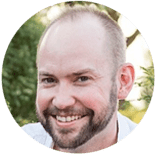
Myal Greene has a deep desire to see churches worldwide equipped, empowered, and engaged in meeting the needs of vulnerable families in their communities. In 2021, he became President and CEO after serving for fourteen years with the organization. While living in Rwanda for eight years, he developed World Relief’s innovative church-based programming model that is currently used in nine countries. He also spent six years in leadership roles within the international programs division. He has previous experience working with the U.S. Government. He holds B.S. in Finance from Lehigh University and an M.A. from Fuller Theological Seminary in Global Leadership. He and his wife Sharon and have three children.
Share the Gift Pt. 2: Paying it Forward to Empower Women in Turkana
Tomorrow is Giving Tuesday. We invite you to share-the-gift by paying it forward alongside women in Turkana County. Earlier this month you heard about a powerful share-the-gift project in Karebur Village, Turkana.
500 miles north, in Kachoba Village, another share-the-gift project is also taking root. This time, it’s combating malnutrition while empowering women to take on new and important roles within their families and community.
Sharing the Gift in Kachoba
Turkana has predominantly been a patriarchal society. Men are the leaders and the heads of the household and are responsible for making decisions concerning family wealth including slaughtering livestock for food and/or choosing which livestock gets sold or traded.
In this pastoralist community, it is common for the men to leave the home weeks at a time, taking the livestock out to graze where they can find food. In better times, households would have food in the reserve. They would slaughter an animal, cut the meat into thin strips like spaghetti then hang it out in the sun to dry completely. Then, they’d salt the meat and keep it above the fireplace which is always smoking, thus preventing the meat from rotting.
If one household was running low on food, a neighbor might put some of their meat in a pot to make some broth and offer it to others. Again, hands meeting in the pot!
Today, however, climate change and drought is threatening their very way of life. As the livestock is dying off, there is less meat for people to eat, and the remaining livestock struggle to produce milk. Malnutrition is rampant and is affecting children under five at increasingly high rates.
As the primary caregivers of the home and children, women have valuable insights into their family’s needs. And yet, they are not consulted on decisions that affect livelihoods, livestock or daily food intake. In order to combat malnutrition in Kachoba, women need to weigh in.
Care Groups and Creative Problem Solving
Many of the women in Kochoba are involved in World Relief’s Care Group program, where together they began brainstorming new food options to improve household nutrition.
Initially, the mothers proposed milking goats, but concluded they would have a hard time finding adequate feed for their goats. The cyclic drought caused by climate change has made foliage — a goat’s source of food — hard to come by. Underfed goats cannot produce an adequate amount of milk to feed their families.
As the women talked further, they proposed the idea of chickens. Chickens are smaller animals so they are easier to feed. And while men typically control decisions related to livestock, they see chickens as too small for them to worry about.
In 2021, World Relief gifted 50 participating women with four chickens and one cockerel. The women agreed that once their chickens reproduce, they will give away a similar number — three chickens and one cockerel — to another lady in her community.
Because men don’t care for chickens, women are able to have an asset in their hands that they can control, and which can significantly improve nutrition at the household level.
They’re also able to make decisions about whether or not they want to sell one of the cocks or chicks to purchase something they need such as medication for a sick child. Although the project is less than a year old, we are seeing improvements in the way families relate to one another. It has helped women a great deal.
Moving Together Toward Lasting Change
The share-the-gift project is just one part of an expansive community development project in Turkana. The local church networks in the area continue to supervise these projects, ensuring that the seed of love first planted by World Relief will saturate the entire community so that every household has the chance to receive and improve their livestock.
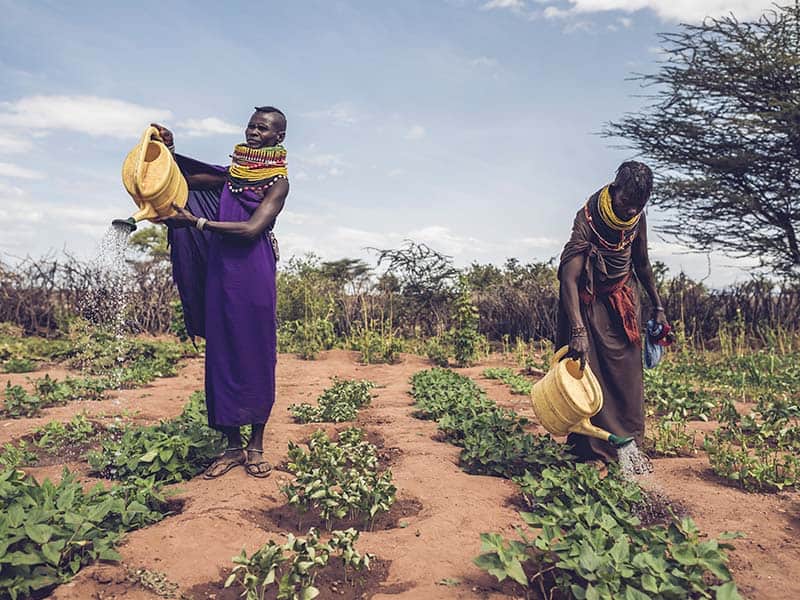
That’s where the whole joy today is. We are not just creating solutions for people to have food to be stronger. We are creating solutions that are wholesome, uprooting the community from poverty, to a place of holistic transformation, where they are able to take charge of their destiny.God loves his people and is infinitely interested in their welfare. That statement is true whether someone is a project coordinator or implementer (like our staff) or a project beneficiary. We are moving together, growing and learning together as we seek to create lasting change in our communities and around the world.
Share your gift this Giving Tuesday by paying it forward on behalf of a friend or family member. When you give today, you’ll receive a digital card to send to your loved one, letting them know about the lasting change their gift is creating.
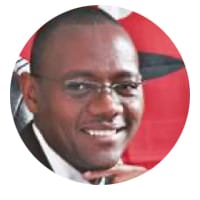
Elias Kamau serves as Country Director at World Relief Kenya. He has over 20 years of experience in humanitarian and development work in various countries including South Sudan, Somalia, Haiti, Kenya and Sudan. He started his career as a schoolteacher rising to the position of Director of External Studies and Continuing Education and successfully trained teachers in and out of Kenya. Exposure to the plight of refugees while serving as an education and training consultant in the sprawling Dadaab Refugee camps in Northern Kenya marked a turning point in his life. He resigned his position with the government feeling called to those vulnerable people. He went on to serve them in some of the poorest parts of the Horn of Africa where he held various positions with reputable International organizations including CARE, Norwegian Church Aid, International AID Services and World Concern among others before joining World Relief. Elias lives in Nairobi with his family including his wife Phelista and two children; a girl and a boy. He enjoys making friends and sharing the love of Jesus.

Oliver Otsimi serves as the Turkana Program Manager at World Relief. He holds a Bachelor’s degree in Environmental Studies (Community Development) and post graduate trainings in Horticultural Crop Production and Post-Harvest Technology, Agribusiness and Marketing. Oliver is studying for a Masters degree in Project Planning and Management at Maseno University. Oliver’s ambition is to positively transform poor households achieve food security and prosperity to enable them live a life of dignity as intended by God. He is married to Pamela and they have two children.
10 Reasons to Give Thanks in 2021
2021 has been a challenging year. Like you, we’ve felt the pain of loss, the ache of division in our churches and communities and the harsh realities of ongoing injustice around the world. This Thanksgiving, we may even feel tempted to ask, What’s there to give thanks for?
And yet at World Relief, we’ve found there’s much to be grateful for in 2021. In the midst of the crises and the chaos, God has opened doors, made paths straight and raised up partners who move with us to serve those experiencing vulnerability. We asked 10 of our staff from around the world to share just some of what they’re grateful for this year. We hope their testimonies of God’s faithfulness shining through in 2021 will inspire you to “give thanks in all circumstances” (1 Thess. 5:18), as they have us.
What are you grateful for in 2021?
Karen Crisler, Community Engagement Manager, Appleton, WI: I’m grateful to be in a field of work that is laboring towards restoration; that despite the fractures in all spheres of life, redemption is at work. I’m also grateful that I’m slowly learning that this work doesn’t rest on my shoulders, but rather my daily need is what tethers me to Jesus. I’m so thankful that I got to join the World Relief staff this year!
Clemence Nkulikiyinka, Integral Mission Technical Advisor, Rwanda: I am thankful that God’s grace has sustained us in 2021. World Relief has been able to keep human resources, despite the challenges brought by the pandemic. I am grateful for the ability to virtually connect with colleagues and opportunities to visit and support in-person as the world reopens. I am grateful that we have access to vaccines, and that they are reducing the mortality rate.
Matilda Matitha, Country Director, Malawi: I am thankful to God because he continues to protect WR Malawi staff and their families from Covid 19 as we serve vulnerable communities. I am also grateful to God for the opportunity to be part of the great mission in WR Malawi where we are reaching close to 1.9 million people.
Abby Ray, Communications & Advocacy Coordinator, High Point, NC: I’m extremely thankful that God provided a job for me at World Relief. Working for an organization that aligns with my personal mission and values, and working with people who care about me as not only an employee but a neighbor and sister of Christ, is so encouraging. I’m incredibly thankful for all of the people in our office who take such good care of our clients and church partners.
Katie Love, Preferred Communities Program Manager, Baltimore, MD: We are grateful that God has provided through government grants and private donations to meet the needs of thousands of Afghans arriving in America. With these funds, we will be able to support housing and mental health needs, provide one-one-one case management and help pre-literate Afghan women build community and gain access to resources through literacy training.
Andualem Mekonnen, Program Quality Specialist, South Sudan: I am very grateful to God Almighty for keeping me and my family protected from the horrendous COVID-19 pandemic. I am also grateful for the opportunity God has opened for me to serve the marginalized and neglected communities in South Sudan through World Relief.
Bailey Clark, Communications Coordinator, Memphis, TN: We are so grateful for our host families and their incredible hospitality toward refugee families. Hearing their sweet, encouraging stories has been a huge blessing.
Ileana Gómez, CYRUS Support, Nicaragua: I’m thankful for the opportunity to get to know our staff in South Sudan and Kenya while living with and learning from them. Their work is amazing! I saw the commitment of each of them to our vision at World Relief — that was a blessing and is still a blessing. I’m grateful that I could have this wonderful experience, and I thank God that he returned me home safe and sound in 2021.
Megan Ashley, VP of Marketing, Chicago, IL: I’m thankful for the commitment to excellence each member of the World Relief team brings to their work. It seems to be in each person’s DNA to bring our best to those we’re working with and for — even when it can mean extra hours, tough conversations or adapting overnight to an unfolding need somewhere in the world. Whether it’s our best writing, design, client care, policy, program, etc., we’ve been blessed with people who care.
Jeff Walser, Senior Director of Development, Tampa, FL: I am so thankful for the presence of God through his people in my life. It’s been a chaotic year of ups and downs, hopes gained and hopes lost. As I’ve struggled to keep buoyant, God’s people — with steady loving hands, patient words of encouragement and faith-filled prayers — have redirected my gaze to the One who calms the winds and waves and leads us forward into the work he has given us to do.
Share the Gift Pt. 1: How One Community in Turkana Is Paying it Forward
Hands Meeting in the Pot
Turkana County, Kenya, is not an easy place to live. Some have even referred to it as the oven of the world. High temperatures hover at an average of 95 degrees Fahrenheit. The air is dry, and rainfall is scarce.
Many residents have lost all their livestock due to persistent drought, and malnutrition is rampant — especially among children whose mothers struggle to produce enough milk to feed them due to their own dietary deficiencies. And yet, a culture of generosity and creativity is giving way to hope and innovation in partnership with World Relief.
Because of the sheer hardness of life in Turkana, community members have developed strong relationships and social capital with one another, depending on each other greatly. You may often hear stories of Turkanans moving to the United States or Australia to work. The money they make is sent home, often supporting several households.
Turkanans even have a saying, which goes, “It is best for your hands to meet in the pot, licking fingers with nothing, than it is for you to have a big meal in front of you to eat all alone.”
This idea of giving to your relatives and neighbors is an ingrained way of life in Turkana. And it is this way of life that has led to a new program called Share the Gift in the Karebur and Kachoba communities.
Introducing the Galla Goat
World Relief began working in Turkana in 2011 in response to a drought-induced food crisis. At the time, one-third of the population suffered from malnutrition. We collaborated with local churches and community members to seek solutions to these issues, and together, we developed robust programming around the issues of food and water security — including introducing a new breed of goats to the region, the Galla goat. Galla goats are a specialized, drought-resistant breed of goats. News outlets like NPR have called them “super goats” because of their ability to withstand high heat.
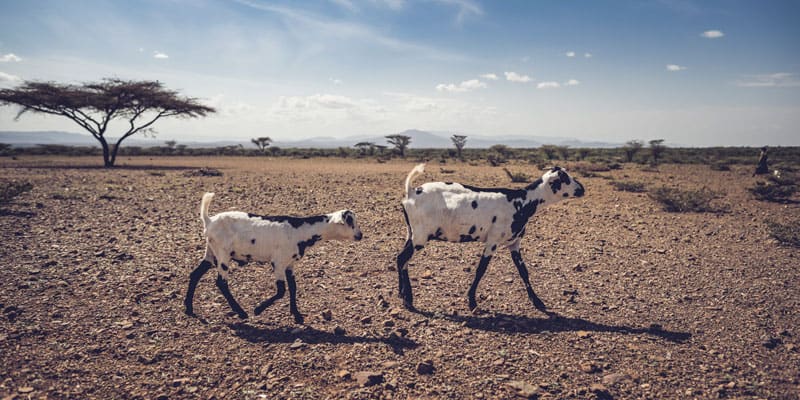
Initially, many Turkanans were skeptical about the new breed. Their goats were red, and the Galla goats were white. These pastoralist men were proud of their livestock and treasured their red goats. Likewise, they feared the white goats would be easier to spot leaving them prone to conflict or theft.
But as they came to see that the Galla goats were superior — they produced more milk, matured faster and fetched higher prices at the markets — they became more willing to give the goats a try.
Sharing the Gift in Karebur
While the Galla goats are, themselves, a gift and a miracle, in 2019 World Relief worked with local churches in the Karebur Village to take things a step further. Together, they designed the first share-the-gift project.
Under the guidelines of this initiative, 20 women were each gifted a Galla goat and each committed to gifting the first female offspring from their goat to another, equally needy person in the community. From there, the chain reaction would begin, until everyone had access to a Galla goat.
Akiru was one of the first 20 women to receive a goat.
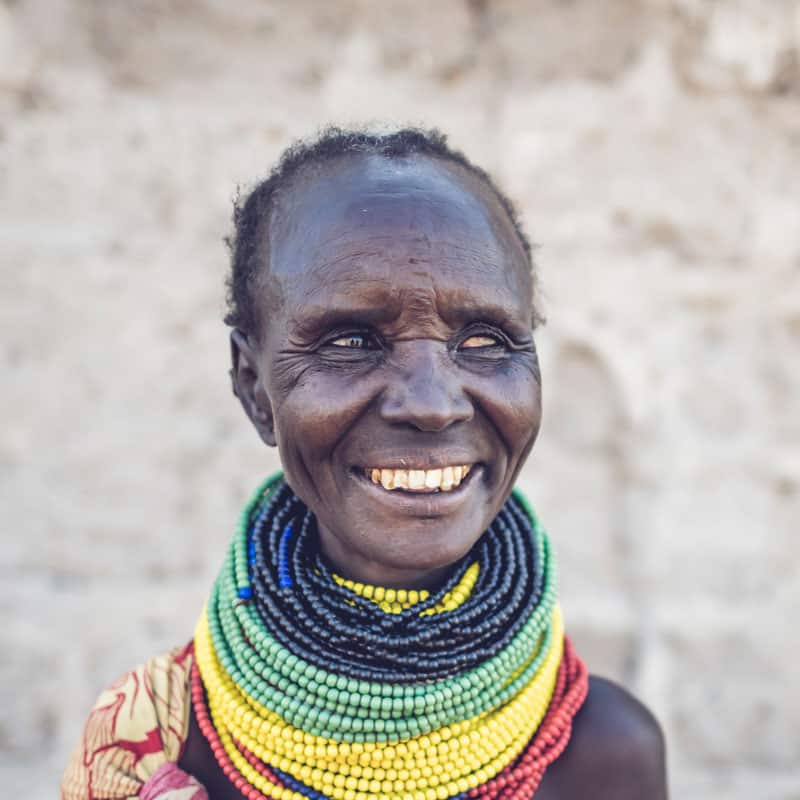
“I love Karebur Community because of the unity and love [we] have for each other… Life has always been a struggle in our community. The drought has always been with us and our goat breeds had been deteriorating as their body sizes had been diminishing and so was their production. The gift of an improved goat was indeed a blessing to us.
I remember during the first lactation the goat produced a lot of milk which was enough for my (own) family’s use and there was surplus milk, which we could share with my neighbor. The gifted goat was such a blessing.”
In early 2021, after the initial 20 goats had produced offspring, the goats’ owners stayed true to their commitment and gifted their first female offspring to others in the community. Women like Anna received the tangible provision of sustenance as well as a renewed sense of connectedness with her friend and neighbor.
“The goat from [my]neighbor has improved our relations for the better. My neighbor now is like a very close relative as a result of the bond of caring resulting from this valuable gift of love,” she said.
The share-the-gift project is just one part of an expansive community development project in Turkana that is made possible when we move together. The local church networks in the area continue to supervise these projects, ensuring that the seed of love first planted by World Relief will saturate the entire community so that every household has the chance to receive and improve their livestock.
You, too, can share the gift this season. Your gift of $60 can make a huge difference in the lives of the most vulnerable around the world, including supplying a goat to a family in Turkana!
Will you give the gift of hope and lasting change this season?

Elias Kamau serves as Country Director at World Relief Kenya. He has over 20 years of experience in humanitarian and development work in various countries including South Sudan, Somalia, Haiti, Kenya and Sudan. He started his career as a schoolteacher rising to the position of Director of External Studies and Continuing Education and successfully trained teachers in and out of Kenya. Exposure to the plight of refugees while serving as an education and training consultant in the sprawling Dadaab Refugee camps in Northern Kenya marked a turning point in his life. He resigned his position with the government feeling called to those vulnerable people. He went on to serve them in some of the poorest parts of the Horn of Africa where he held various positions with reputable International organizations including CARE, Norwegian Church Aid, International AID Services and World Concern among others before joining World Relief. Elias lives in Nairobi with his family including his wife Phelista and two children; a girl and a boy. He enjoys making friends and sharing the love of Jesus.

Oliver Otsimi serves as the Turkana Program Manager at World Relief. He holds a Bachelor’s degree in Environmental Studies (Community Development) and post graduate trainings in Horticultural Crop Production and Post-Harvest Technology, Agribusiness and Marketing. Oliver is studying for a Masters degree in Project Planning and Management at Maseno University. Oliver’s ambition is to positively transform poor households achieve food security and prosperity to enable them live a life of dignity as intended by God. He is married to Pamela and they have two children.
We Move Together
Compounding Crises
In my 14 years of working at World Relief, I have never felt the weight of compounding crises quite like I have this last year.
The same week I stepped into my new role as President and CEO, a 7.2 magnitude earthquake hit Haiti and Kabul fell to the Taliban, putting thousands of Afghan allies and civilians at risk.
Like many of you, I watched heartbroken and angry at the sight of such injustice as women and men chased after U.S. aircraft carriers, desperate to get to safety. And all of this on top of a global pandemic, on top of a global economic crisis, on top of unrest in places like Tigray and Geneina, a food crisis in DR Congo and a multitude of other crises that never make headline news.
We are living through some of the greatest humanitarian crises of our lifetime. It’s a lot to take in, and certainly too much for any one person to hold alone.
And yet, there is hope.
Called to Be the Church
In Acts chapter 17, the Apostle Paul writes that God himself gives life and breath to everyone, that he has marked out the appointed times in history and the very places where each of us exists. In other words, the church — that’s you, and that’s me — was created for such a time as this!
I will never cease to be amazed at the way God can move through his church and his people.
In my time serving as Country Director of World Relief Rwanda, I saw church members from our local Church Empowerment Zones come together in incredible ways to care for those suffering from AIDS, build peace among families who had harmed one another and lift their communities out of economic poverty.
Similarly, over the last few months, churches across the globe have responded greatly to the crises in Haiti and Afghanistan. Many of you have generously reached out with prayers and donations.
Together, we have welcomed and resettled more than 600 Afghan refugees since August. Our staff in the U.S. are currently working their way through 4,128 volunteer applications that have been submitted since August — that’s more volunteer interest in a six-week period than the total number onboarded for the entirety of the fiscal year 2020.
And with the help of 300 local volunteers, our team in Haiti has distributed kits of food and hygiene items to over 4,400 families affected by the August earthquake.
The wave of generosity has been inspiring. It has reminded us that while creating change that lasts isn’t easy, it’s possible when we move together.
Moving Together
How powerful it is to know that you and I were created for such a time as this? And what responsibility does this place on us, I wonder?
Today, the local church in Haiti is leading the way as we help the communities of Les Cayes rebuild. In the U.S., roughly 50,000 Afghans are living at U.S. military bases awaiting their resettlement assignments. Our U.S. office network of staff, churches and volunteers is preparing to receive as many as 7,000.
We have the opportunity to respond together as God’s church — to not be overcome by evil and injustice, but to overcome evil with good (Romans 12:21). Across the globe, men and women just like you are rising up to meet the needs of the most vulnerable among them, and you can join them.
No one of us can carry the world’s burdens on our own. But when we move together, anything is possible. Will you join us?
Move with us this season by signing up for this four-part Advent series delivered right to your inbox. You’ll receive an invite to a virtual gathering plus updates on how to stay involved and make lasting change at home and around the world.

Myal Greene has a deep desire to see churches worldwide equipped, empowered, and engaged in meeting the needs of vulnerable families in their communities. In 2021, he became President and CEO after serving for fourteen years with the organization. While living in Rwanda for eight years, he developed World Relief’s innovative church-based programming model that is currently used in nine countries. He also spent six years in leadership roles within the international programs division. He has previous experience working with the U.S. Government. He holds B.S. in Finance from Lehigh University and an M.A. from Fuller Theological Seminary in Global Leadership. He and his wife Sharon and have three children.











